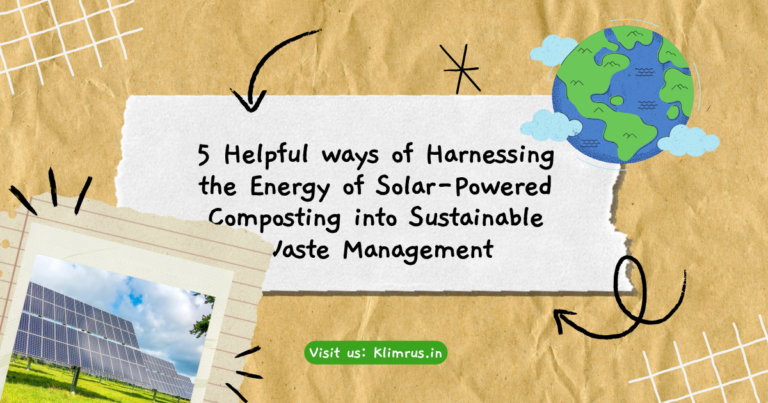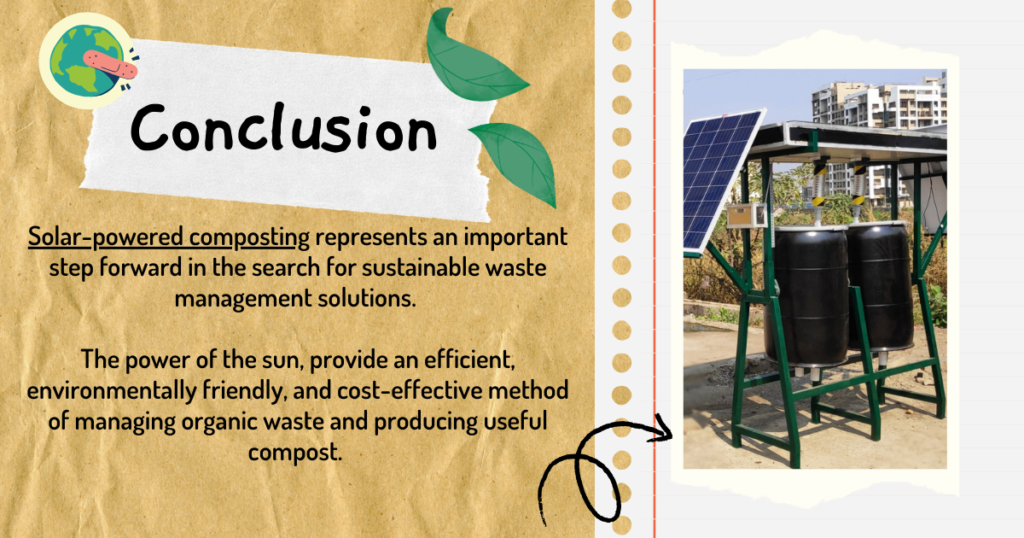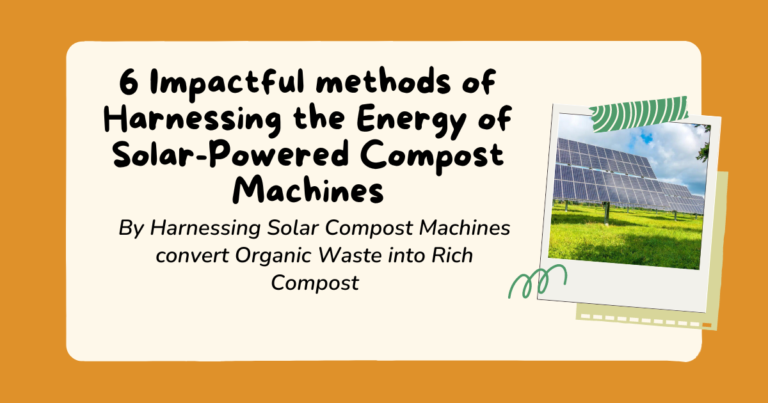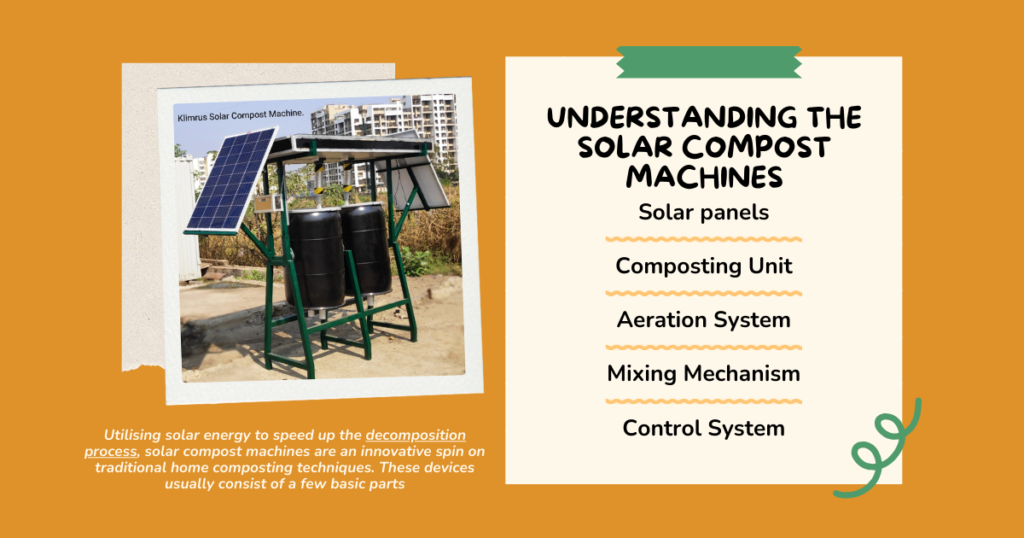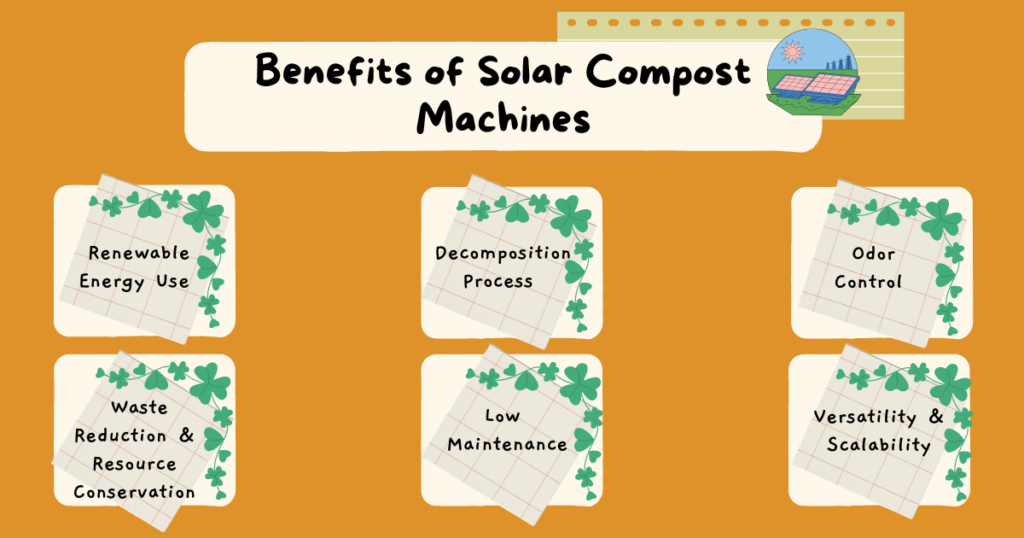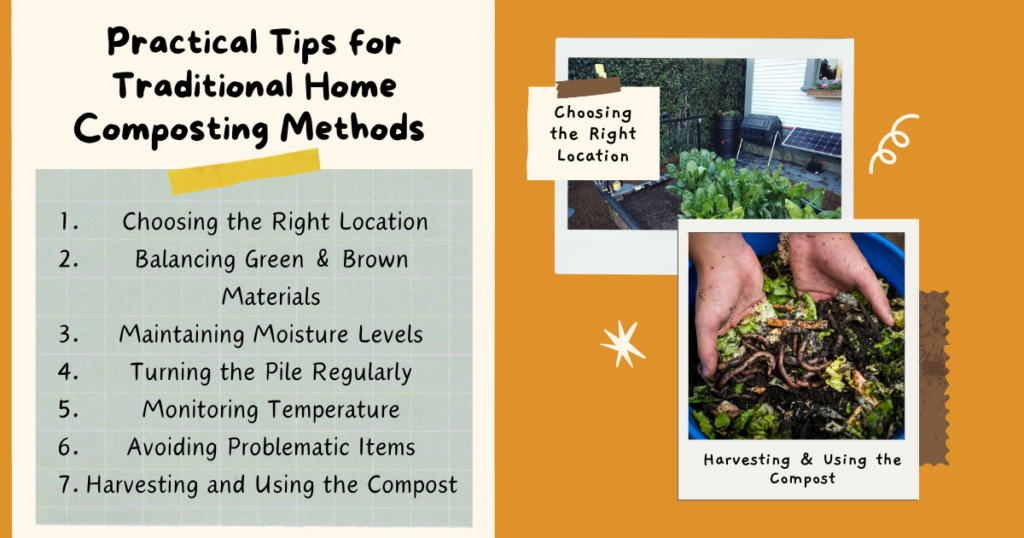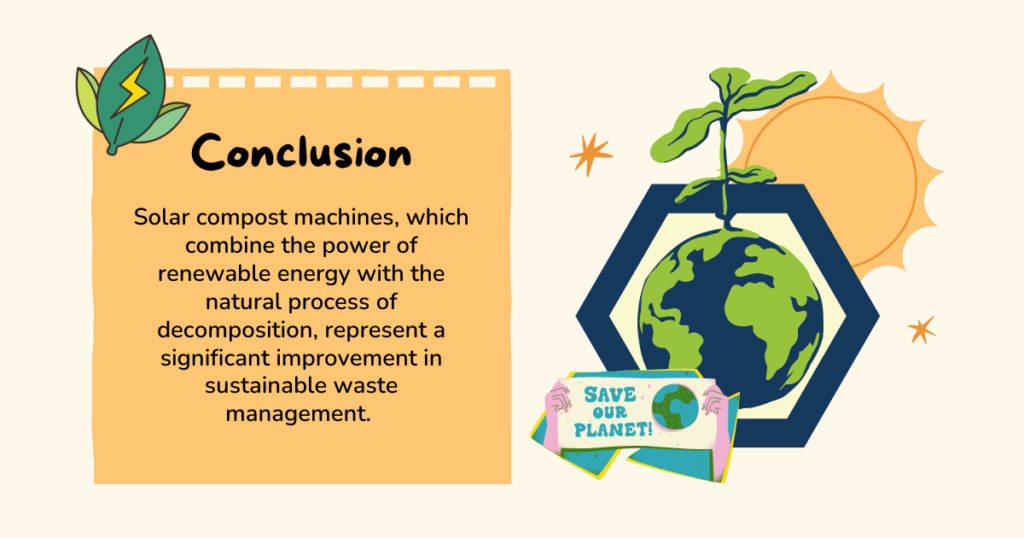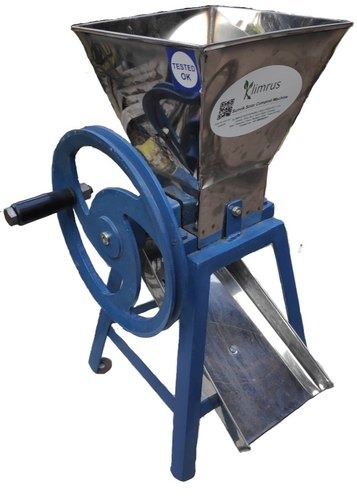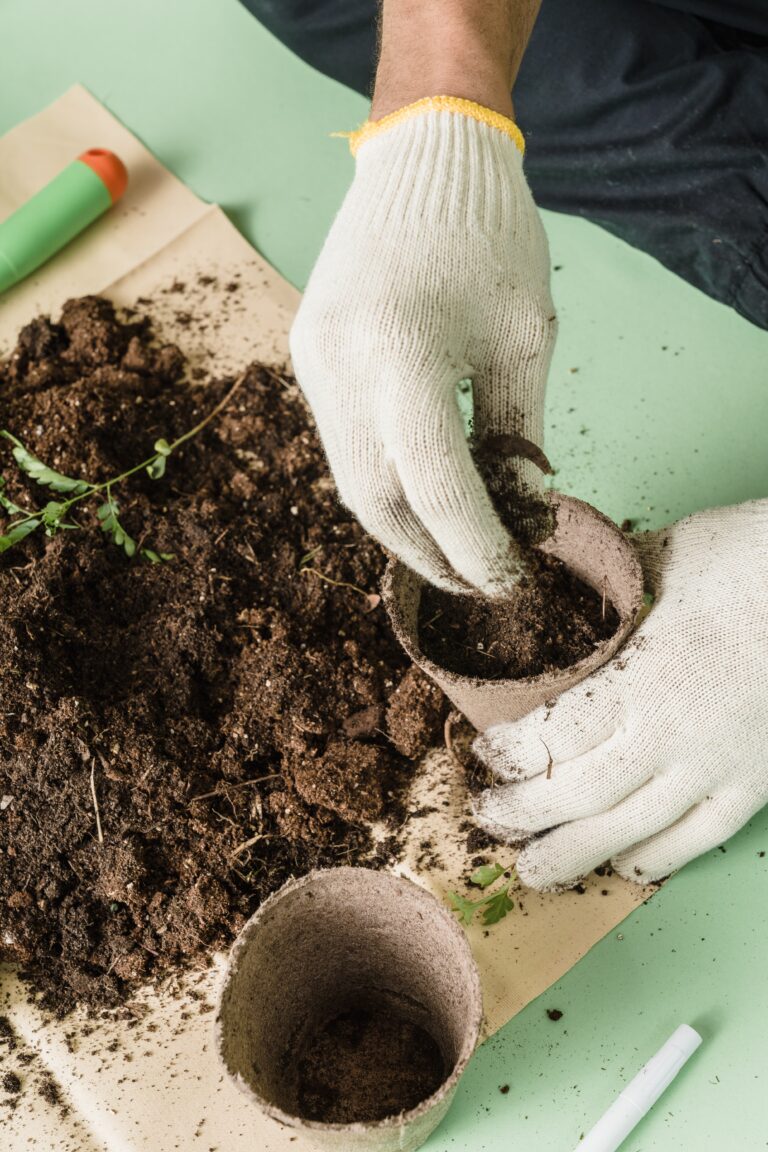A Deep Dive into Solar-Powered Composting and Sustainable Waste Management
In recent years, the search for Solar-Powered Composting systems and Sustainable Waste Management solutions has resulted in innovative technologies that strive to reduce our environmental impact. Among these improvements, solar-powered composting machines are particularly promising. Solar-powered composting systems, which combine renewable energy with sustainable waste management strategies, provide a new way to handle organic waste in an effective and sustainable manner. This blog delves into the notion of solar-powered composting, including its benefits, impacts, and place within the larger context of sustainable waste management.
Understanding Solar-Powered Composting
Solar-powered composting brings together two powerful concepts: solar energy and composting. This fusion uses renewable energy to improve the solar-powered composting process, resulting in a more efficient and environmentally responsible way of converting organic waste into valuable compost:
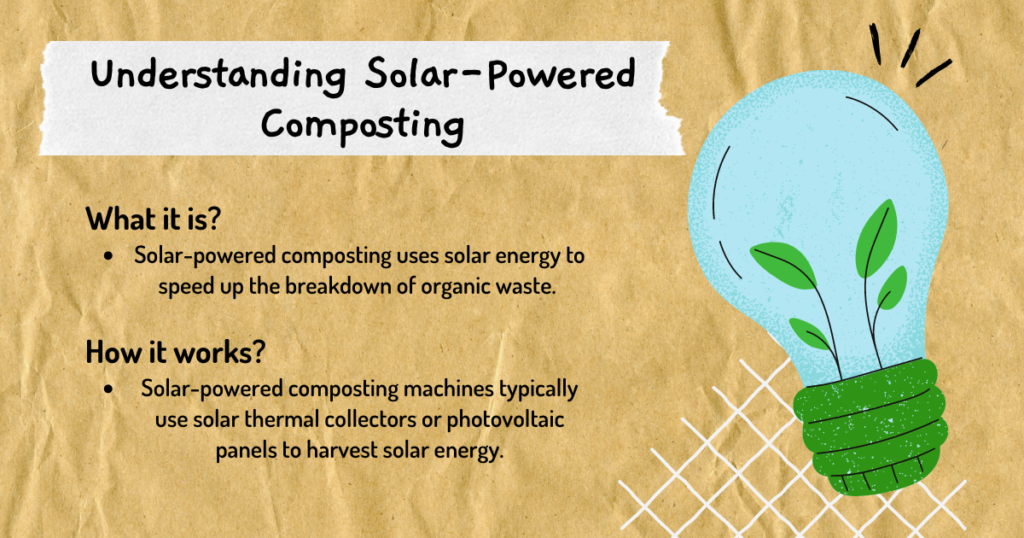
What is Solar-Powered Composting?
Solar-powered composting uses solar energy to speed up the breakdown of organic waste. Traditional composting relies on microbial activity to degrade organic matter, which can be sluggish and affected by environmental factors. Solar-powered composting machines improve this process by harnessing solar energy to generate heat, which increases microbial activity and compost generation.
How Does the Solar-Powered Composting Works?
Solar-powered composting machines typically use solar thermal collectors or photovoltaic panels to harvest solar energy. Solar thermal collectors capture sunlight and convert it to heat, which is then utilized to warm the compost pile. This increase in temperature produces an excellent environment for microorganisms, allowing for rapid breakdown. In certain systems, photovoltaic panels create electricity to power additional components like blowers or heaters, which improves the composting process.
Benefits of Solar-Powered Composting for a Sustainable Waste Management Solution
The integration of solar energy into composting systems brings numerous advantages, making it an attractive option for both individual and community-scale applications.
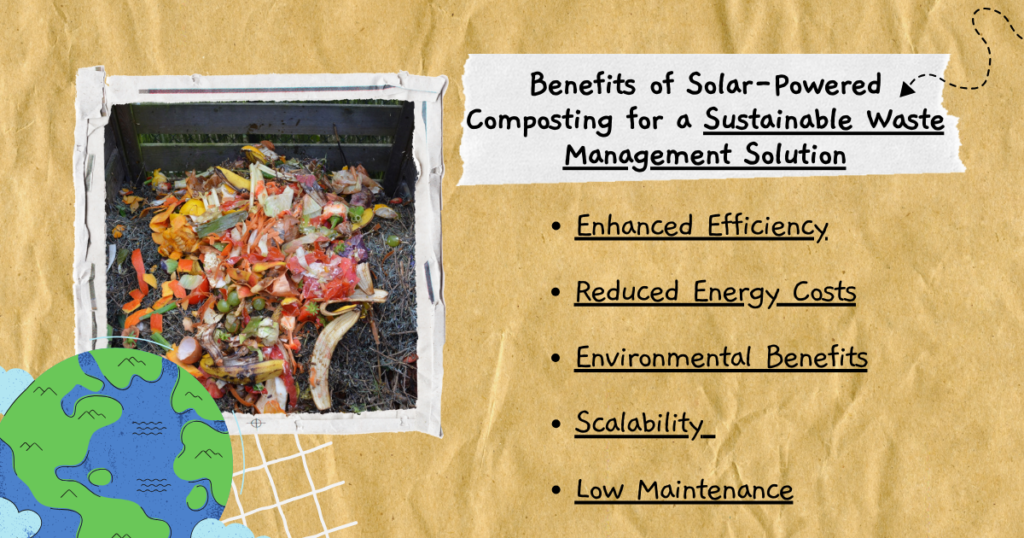
1. Enhanced Efficiency
Solar-powered composting machines accelerate decomposition by delivering continuous heat. This accelerates the formation of high-quality compost, which may be used to enrich soil and promote plant development. Traditional composting processes can take months to produce compost, whereas solar-assisted systems can achieve the same results in a tenth of the time.
2. Reduced Energy Costs
Solar-powered composting machines accelerate decomposition by delivering continuous heat. This accelerates the formation of high-quality compost, which may be used to enrich soil and promote plant development. Traditional composting processes can take months to produce compost, whereas solar-powered composting systems can achieve the same results in a tenth of the time.
3. Environmental Benefits
Solar-powered composting is a sustainable waste management option for the environment. The Solar-powered Composting systems use renewable energy to manage organic waste, reducing dependence on nonrenewable resources and lowering greenhouse gasses. Furthermore, the compost created improves soil quality, promotes plant growth, and lowers the need for chemical fertilizers.
4. Scalability
Solar-powered composting systems are adaptable and may be adjusted to meet a variety of demands. Solar-powered composting technology is adaptable to a wide range of situations, from small-scale home units to big community or industrial systems. This adaptability makes it a viable choice for a wide range of applications, from urban gardening to agricultural operations.
5. Low Maintenance
Once installed, solar-powered composting systems require minimal maintenance. The solar components are long-lasting, and the composting process is mostly self-sufficient. The main maintenance tasks for these systems are usually regular tuning and monitoring of the compost pile, which makes them easy to use.
Impacts of Solar-Powered Composting on Sustainable Waste Management
The adoption of solar-powered composting machines has far-reaching impacts that extend beyond immediate waste management benefits.
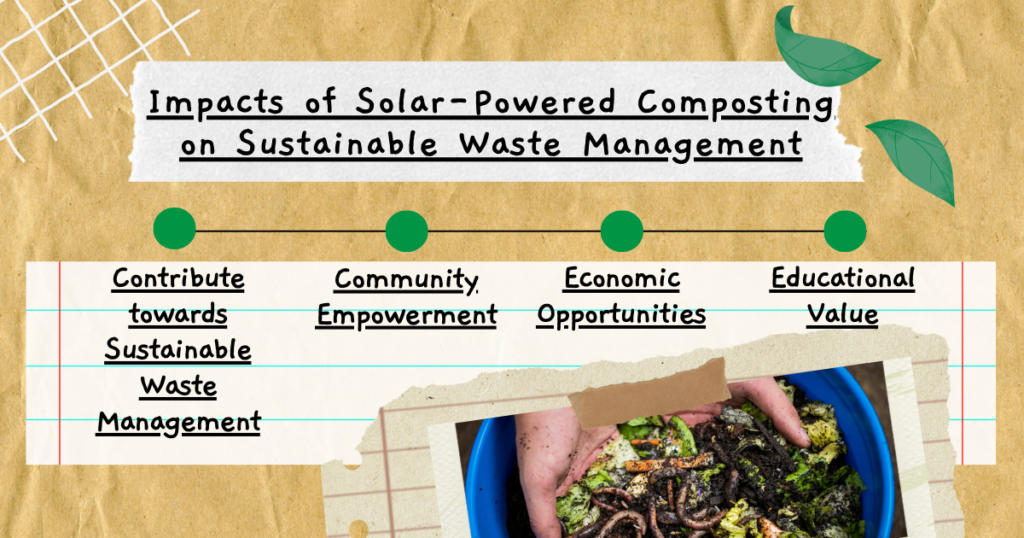
1. Contribute towards Sustainable Waste Management
Solar-powered composting aligns with several United Nations Sustainable Development Goals (SDGs), particularly those related to responsible consumption and production (SDG 12) and climate action (SDG 13). By promoting the use of renewable energy and reducing waste, these systems contribute towards sustainable waste management.
2. Community Empowerment
Incorporating solar-powered composting into community of sustainable waste management programs can empower local communities. By providing a practical and environmentally friendly solution to organic waste, these systems foster a sense of responsibility and involvement in sustainability efforts. Communities can benefit from improved sustainable waste management, reduced landfill use, and enhanced soil quality.
3. Economic Opportunities
The development and implementation of solar-powered composting systems create economic opportunities in the renewable energy and sustainable waste management sectors. Jobs in manufacturing, installation, and maintenance of these systems contribute to economic growth and technological innovation. Additionally, the production of high-quality compost can be monetized, providing an additional revenue stream for individuals and organizations.
4. Educational Value
Solar-powered composting machines offer valuable educational opportunities. They serve as practical examples of how renewable energy can be harnessed for environmental purposes, making them effective tools for teaching sustainability concepts. Schools, community groups, and environmental organizations can use these systems to engage people in learning about green technology and sustainable waste management solutions.
Integrating Solar-Powered Composting into Sustainable Waste Management
To fully realize the potential of solar-powered composting, it is essential to integrate it into broader sustainable waste management strategies.
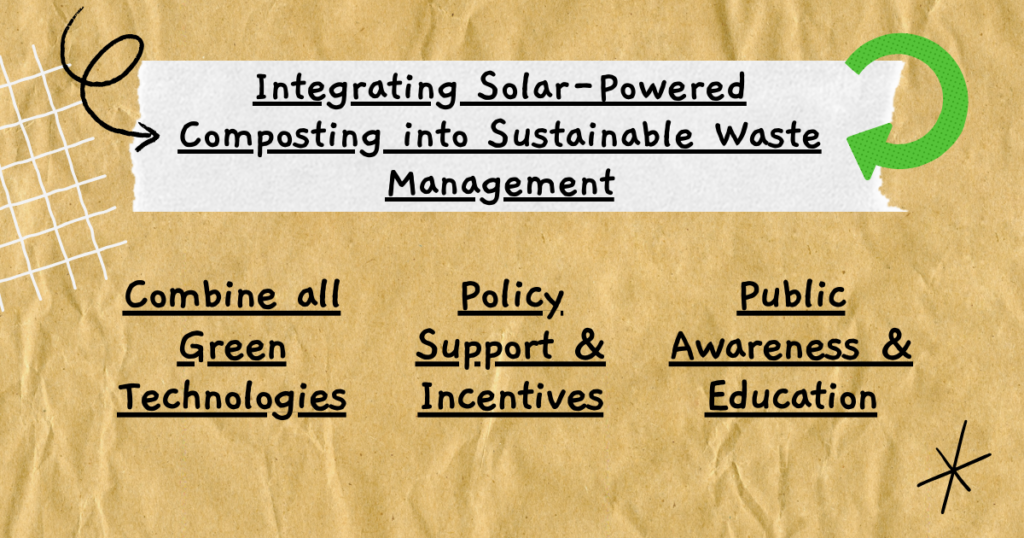
1. Combine all Green Technologies
Solar-powered composting system can be effectively combined with other green technologies to enhance overall sustainability. For example, integrating rainwater harvesting systems can provide the necessary moisture for composting, while energy-efficient lighting and irrigation systems can further reduce resource consumption.
2. Policy Support and Incentives
Government policies and incentives play a crucial role in promoting the adoption of solar-powered composting systems. Supportive regulations, subsidies, and tax incentives can make these technologies more accessible and attractive to individuals and organizations. Collaboration between policymakers, industry leaders, and community stakeholders is essential for driving widespread adoption.
3. Public Awareness and Education
Raising public awareness about the benefits of solar-powered composting system is key to its successful implementation. Educational campaigns, workshops, and demonstrations can help inform people about the advantages of solar-powered composting systems and how to use them effectively. Engaging communities in sustainability initiatives fosters a culture of environmental responsibility and encourages broader participation.
Conclusion:
Solar-powered composting represents an important step forward in the search for sustainable waste management solutions. Solar-Powered Composting systems, which harness the power of the sun, provide an efficient, environmentally friendly, and cost-effective method of managing organic waste and producing useful compost. Individuals, communities, and organizations alike find solar-powered composting system appealing because of its increased efficiency, lower energy costs, and environmental impact.
As we explore new answers to environmental concerns, incorporating solar-powered composting system into broader sustainable waste management practices will help usher in a greener, more sustainable future. Embracing this technology, along with other green practices, pave the path for a more resilient and environmentally conscious world, showcasing renewable energy’s ability to handle global concerns.
